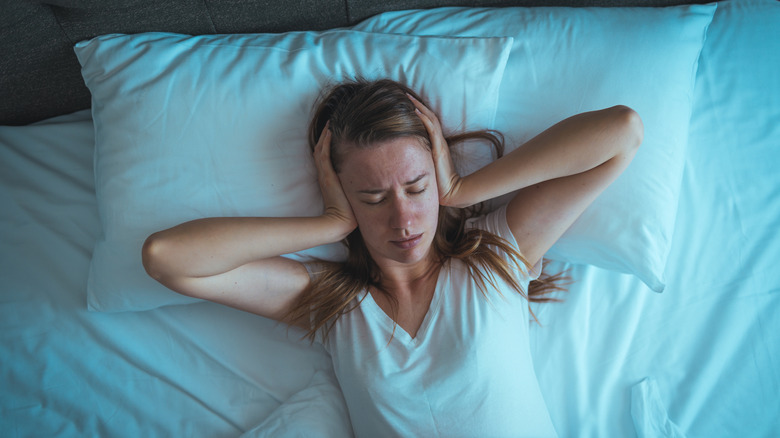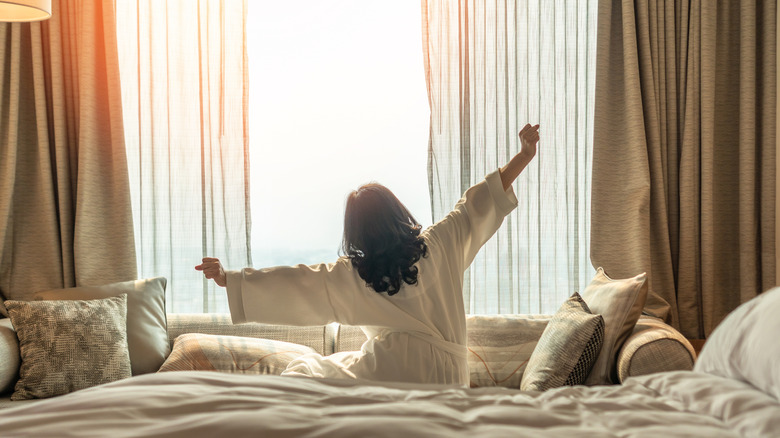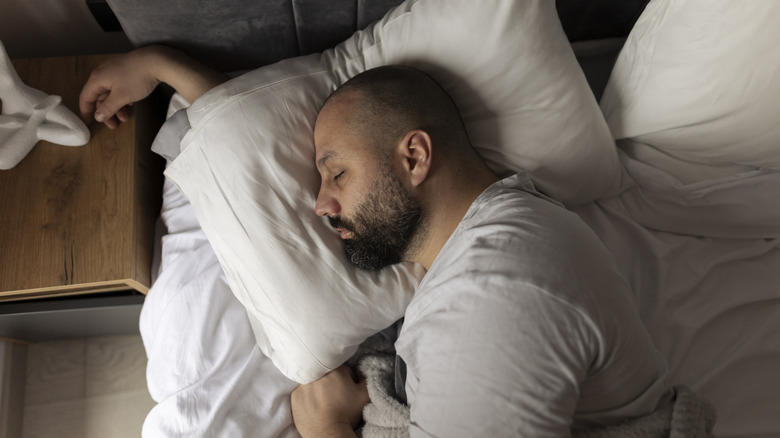Disrupted Sleep During Travel Can Lead To Some Serious Health Side Effects (And How To Get Your Best Sleep)
Whether you're taking off on a week-long business trip to the other side of the world, jetting off to Europe for vacation, or visiting family and friends on the other side of the country, you're likely going to have a hard time getting your usual amount of sleep. It may not seem like a big deal to miss a few days of normal rest, but disrupted sleep during travel can actually lead to some serious health side effects, and it may start before you even leave your home. In a 2025 study published in the journal Sleep, which analyzed 1.5 million nights of data from sleep trackers on people who were traveling, it was found that the night before travel was when people started losing ZZZs. Reasons included things like getting up early for a flight or concerns about delays and cancellations. Even worse? It can take over two weeks to get back to normal after returning home. The study found that sleep disruption is worse when people are traveling east, and the more time zones you go through, the more severe it will be.
Being a bit sleepy may not seem like much of an issue, but in a 2013 report published in Chest, it was found that sleep disturbances from traveling can have both cognitive and physiological effects, causing daytime sleepiness and impairment of both physical and mental faculties. You may develop issues with your stomach, mood, and immune functions. Even worse is that, if you travel a lot and have sleep issues, it can raise your risk for heart disease, depression, obesity, diabetes, and even cancer. However, there are some steps you can take to make things easier on yourself.
Sleep issues while traveling and what to do about jet lag
Even if you're just taking a single trip, changes in your mood may cause you to be grouchy while you're supposed to be relaxing. Diminished concentration can be dangerous, especially if you're driving a rental car, sometimes on the other side of the road. The issues can come in a number of forms. You may not get great sleep before you leave because you're worried about the trip going badly. Additionally, you might experience an initial night of poor rest called the "first-night effect" in a hotel or new bed, whether it's because it's uncomfortable, or just due to your body's way of staying alert in a new place. Then there is jet lag, which usually happens if you travel between three or more time zones. However, there are ways to help your body adjust and sleep better, some of which you can also use at home.
First, the Centers for Disease Control and Prevention (CDC) recommends adjusting your schedule a few days before travel. It suggests going to bed slightly later than usual when traveling west and an hour or two earlier when traveling east. In addition, the CDC mentions trying to schedule your travel at least two days before any big events. Once you get there, follow the routines of the your destination. Stay in brightly lit areas during the day to help you stay awake until that time zone's bedtime. The CDC also cautions to avoid alcohol, which can disrupt your sleep patterns, as well as avoiding caffeine and exercise in the evening, which can keep you awake. Drink plenty of water, and if you nap, don't do so for more than 15 to 20 minutes, or it can affect your sleep at night.
Things you can do to get better sleep while traveling
There are other things that may help you get better sleep while traveling. First, look into flights that get you there at the right time. For instance, you can book a morning flight to Europe that arrives in the afternoon or evening to help beat jet lag. That way you'll be tired when you get in, so you may sleep better that night. You can try melatonin or sleep aids to fall asleep at a reasonable time, but if you do, discuss this with your health care provider first. You can also try eating smaller meals just before you begin to travel, as stomach issues are a symptom of jet lag, and a heavy meal may make sleeplessness worse.
Bring an eye mask and ear plugs in case the hotel is noisy or the curtains don't close completely. Cool the room down if you can, as it can be harder to snooze in a hot environment. Try a white noise machine or a white noise app that works right from your phone. You can also try some breathing techniques like the ones found on the Calm app or the Finch self-care app (which is great for kids). If you sleep better with your own pillow, bring it. If you have a stuffed animal or comfort item that helps, bring that as well. The same goes for lavender oil on your pillow, an evening cup of your favorite tea, pictures of loved ones on the nightstand, or anything else you find comforting. Finally, if you're carrying life stress into your trip and it's causing you sleep issues, check out some of the best ways to completely unplug and disconnect from work on vacation.


